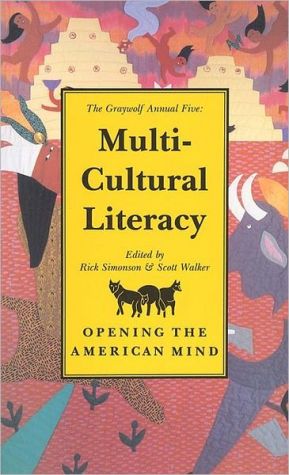Graywolf Annual Five: Multi-Cultural Literacy
The issue of cultural literacy has been the subject of intense debate in the past two years. Several bestselling books about the deficiencies of our educational system as well as changes in basic curriculum at more than one major university have contributed to the fervor of this debate.\ Fueling the national controversy is the question of what body of knowledge constitutes cultural literacy. While many argue for a return to a "back to basics" curriculum, equally energetic voices call for a...
Search in google:
"All of the essays are worthy, readable, and provocative— a few are sublime." —Jonathan Kirsch, Los Angeles Times"... a challenging collection of essays that demonstrate the vitality of those on the margin— women and people of color— and reassert the value of multi-ethnicity on America's intellectual landscape." —Cecile Andrews, Seattle TimesThe issue of cultural literacy has been the subject of intense debate in the past two years. Several bestselling books about the deficiencies of our educational system as well as changes in basic curriculum at more than one major university have contributed to the fervor of this debate.Fueling the national controversy is the question of what body of knowledge constitutes cultural literacy. While many argue for a return to a "back to basics" curriculum, equally energetic voices call for a revised curriculum, one which embraces both traditional western classics and the classics of non-European cultures, among them African, Asian, and Latin American.This volume brings together thirteen essays which suggest the range of knowledge truly literate individuals need to possess. Essays by such writers as James Baldwin, Carlos Fuentes, Michelle Cliff, Paula Gunn Allen, Ishmael Reed, and Wendell Berry enlarge our perspective to include a variety of voices and heritages which contribute to the vibrant culture of the United States.Also included is a beginning list of names, places, dates, and concepts which are part and parcel of a multi-cultural fabric. Publishers Weekly These 13 essays challenge the hegemony of white, Eurocentric and patriarchal America in refuting the canon of national culture proposed by Allan Bloom's The Closing of the American Mind and E. D. Hirsch Jr.'s Cultural Literacy. Such luminaries as James Baldwin and Carlos Fuentes set forth with characteristic eloquence the prejudiced assumptions of the dominant culture. However, the real gems here are the works of lesser-knowns. Literary critic Paula Gunn Allen delineates major (and generally unacknowledged) contributions of North American Indians, noting the similarities of the Iroquois and U.S. federal governance systems, and emphasizing the North American Indian forerunners of modern-day feminists. Jamaican poet Michelle Cliff articulates with originality and precision the predicament of the colonized person of mixed race: ``If we failed . . . it was that one persistent drop of blood, that single rogue gene that made us unable to conceptualize abstract ideas, made us love darkness rather than despise it, which was to be blamed for our failure.'' Despite a few self-important inclusions, this anthology is commanding and persuasive. Simonson is a Seattle-based book-buyer and Walker is Graywolf's publisher. (Dec.)
\ Publishers Weekly - Publisher's Weekly\ These 13 essays challenge the hegemony of white, Eurocentric and patriarchal America in refuting the canon of national culture proposed by Allan Bloom's The Closing of the American Mind and E. D. Hirsch Jr.'s Cultural Literacy. Such luminaries as James Baldwin and Carlos Fuentes set forth with characteristic eloquence the prejudiced assumptions of the dominant culture. However, the real gems here are the works of lesser-knowns. Literary critic Paula Gunn Allen delineates major (and generally unacknowledged) contributions of North American Indians, noting the similarities of the Iroquois and U.S. federal governance systems, and emphasizing the North American Indian forerunners of modern-day feminists. Jamaican poet Michelle Cliff articulates with originality and precision the predicament of the colonized person of mixed race: ``If we failed . . . it was that one persistent drop of blood, that single rogue gene that made us unable to conceptualize abstract ideas, made us love darkness rather than despise it, which was to be blamed for our failure.'' Despite a few self-important inclusions, this anthology is commanding and persuasive. Simonson is a Seattle-based book-buyer and Walker is Graywolf's publisher. (Dec.)\ \ \ \ \ Library JournalThis book enters the fray begun in 1987 with the publication of Allan Bloom's The Closing of the American Mind ( LJ 5/1/87) and E.D. Hirsch's Cultural Literacy ( LJ 6/1/87). The battle is over what we need to know to run a constitutional democracy and why we don't know it. Attacking Bloom's and Hirsch's exclusionist stance, Graywolf's editors demand that greater attention be paid to black, Hispanic, native, and third-world cultures. Among the 13 essays they offer is a moving 1963 account of the black child by James Baldwin and an insightful 1981 autobiography by Carlos Fuentes. There is also a supplement to Hirsch's list of things we all should know. But just how much is necessary for democracy and how much is possible remains uncertain.Leslie Armour, Univ. of Ottawa\ \
